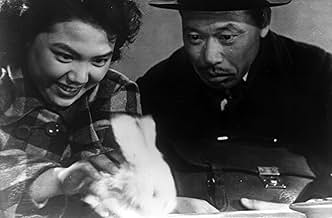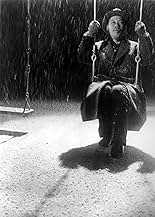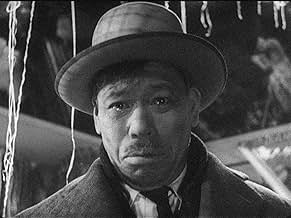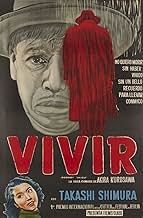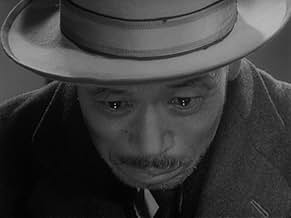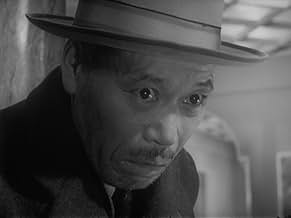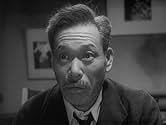Un burocrate cerca di trovare un senso alla propria vita dopo aver scoperto di essere affetto da un cancro terminale.Un burocrate cerca di trovare un senso alla propria vita dopo aver scoperto di essere affetto da un cancro terminale.Un burocrate cerca di trovare un senso alla propria vita dopo aver scoperto di essere affetto da un cancro terminale.
- Regia
- Sceneggiatura
- Star
- Nominato ai 1 BAFTA Award
- 6 vittorie e 2 candidature totali
Recensioni in evidenza
This film touched me in a way no other film has. Filmed in black and white and gorgeous, both in the visuals and in how the story unfolds. Behold the clever manner of gradually unfolding the story as people jog each other's memories at his funeral (an obligation for them, that gradually turns into a real eulogy). Everything is told in flashbacks: the mourners' memories unfold naturally, as people remember what the man did and struggle to comprehend why.
This film I would nominate for the golden five of the century!
I first saw it in 1956 or so at a small theater in downtown Chicago. A second viewing, years later, confirmed my initial pleasure!
This film I would nominate for the golden five of the century!
I first saw it in 1956 or so at a small theater in downtown Chicago. A second viewing, years later, confirmed my initial pleasure!
"Ikiru" is supposedly one of Steven Spielberg's favourite films, and one can see the influence it's had on him not only in the sentimentality and the ultimate "feelgood factor" (which may be a little too extreme for some viewers, although the script never condescends), but visually, especially in the virtuoso sequence in which a reprobate leads our hero, a respectable and dull civil servant, on a whirlwind tour of Tokyo's frenzied nightlife - a masterpiece of camera placement and editing. With images throughout that will stay with you for a long time, and a terrific supporting performance by Miki Odagiri as a vivacious young "office lady", "Ikiru" is still an absolute knockout more than 50 years on.
Kanji Watanabi is a quiet, melancholy man who has spent all his life behind his office desk doing sweet eff-all. When he is diagnosed with stomach cancer he realizes that he has been petty much dead his whole life, and searches desperately for away to live again.
This is Akira Kurosawa's masterpiece, yes, even better than Rashomon and The Seven Samauri. It is a perfect true story of everybody's life- how we don't even realize we have it until we know it will be over in a short while. Watanabi's quest for self-discovery is one of the greatest from any motion picture ever made. The all-too-true paradox is one to end all paradoxes- that Watanabi is dead, and had been all his life, until he realized he was sick, which is when he began living for the first time. Takashi Shimura, the actor best known for his role as the wise, bald-headed Samauri in The Seven Samauri, and the professor out of the early Godzilla films, plays Watanabi perfectly- in my mind, it's one of the greatest film performances of all time.
Not everyone will love this movie. It was made a long time ago, the main character is an old fogey, it has subtitles, and it's pretty long. Many people today, especially young kids, would find it boring. Well, let 'em. There's no need to worry about them, they'll always have Pirates of the Carribbean, they'll always have The Matrix. Leave Ikiru and films like it to the true lovers of cinema.
This is Akira Kurosawa's masterpiece, yes, even better than Rashomon and The Seven Samauri. It is a perfect true story of everybody's life- how we don't even realize we have it until we know it will be over in a short while. Watanabi's quest for self-discovery is one of the greatest from any motion picture ever made. The all-too-true paradox is one to end all paradoxes- that Watanabi is dead, and had been all his life, until he realized he was sick, which is when he began living for the first time. Takashi Shimura, the actor best known for his role as the wise, bald-headed Samauri in The Seven Samauri, and the professor out of the early Godzilla films, plays Watanabi perfectly- in my mind, it's one of the greatest film performances of all time.
Not everyone will love this movie. It was made a long time ago, the main character is an old fogey, it has subtitles, and it's pretty long. Many people today, especially young kids, would find it boring. Well, let 'em. There's no need to worry about them, they'll always have Pirates of the Carribbean, they'll always have The Matrix. Leave Ikiru and films like it to the true lovers of cinema.
10OttoVonB
Ikiru ("to live")is a Kurosawa film devoid of samurai or Toshiro Mifune. It is an oddity in his canon, neither an adaptation, nor an epic, or even a detective story. Instead, it is the simple and touching story of the last months of the life of a man, Watanabbe, public official, who decides to give a meaning to his life by transcending the obtuse and stiff mind of government bureaucracy to get a small public children's park built. As a parable for the soulless workings of modern bureaucracy, the goal is set pretty high, and Kurosawa goes even further, giving this story a lot of character, frequent humor, life and, most of all, heart. And going beyond the strengths of the direction and script, is the central performance by Takashi Shimura (later Kambei in Seven Samurai). Shimura gives his character such a transparently good heart and such great pain that every second of Watanabe's plight and struggle tugs at your heart, not in an overwhelmingly sentimental manner, but in one than feels honest and pure. If even many hardened souls will be drawn to tears, it is not for pity, but, admirably, because of envy for Watanabe's beautiful human dignity in the end, and for a film to have such power is beyond pure accomplishment, as the need to see this and, more importantly, feel it, goes beyond pure necessity...
Akira Kurosawa knew how to get in touch with human nature through his art. With his visual expressiveness and storytelling, he could pierce through his subjects, even in his big and occasionally comical samurai films, and find the elemental things do work. What he probably learned off of Rashomon probably helped out with Ikiru (To Live), a story of an old man who finds out he will die within a year, as both stories deal with perceptions of the significance of a life spent and a life wasted. Though that was to a different degree in Rashomon, with Ikiru Kurosawa expands into full-on existentialism.
The old man Kanji Watanabe (in a wholly believable and often heart-breaking performance by Takashi Shimura) knows his life hasn't amounted to much as a (chief) clerk for the city. He knows he hasn't had a great kinship with his son. He's accepting his fate with a heavy soul. One of the tenets of existentialism is that there's free-will, and the responsibility to accept what is done with one's life. Kurosawa might've (as I speculate, I don't entirely know) caught onto this for his lead, and it works, especially with the little details.
Such little details, unforgettable ones, have been expounded upon by other reviewers and critics, such as the drunken, sullen singing of "Life is short, fall in love my maiden" in the bar. A scene like that almost speaks for itself and yet it's also subtle. But one scene that had me was one not too many talk about. It's when Watanabe is in the Deputy Mayor's office, asking for permission so that a park can be built. At first the Mayor ignores him, but then Watanabe begs, but not in a way that manipulates the audience for sympathy with the old man. The mayor must be sensing something in his eyes, desperate and weak, however determined, and it's something that probably most of the audience can identify with as well, even if they don't entirely identify with the character.
But aside from the emotional impact Ikiru can have on a viewer, composition-wise (with the help of Asakazu Nakai, wonderful cinematographer on less than a dozen Kurosawa films) and editing-wise the film is ahead of its time and another example of Kurosawa's intuitive eye. There are some to-tomy shots sometimes (which could be called typical via master Ozu or other), but everything appears so precise on a first viewing, so descriptive. I think I almost can't go into all of them without a repeat viewing, but there were two that are still fresh in me. The first was right as Watanabe was about to sing in the bar, and there were these bead-strings looming in front of the camera. Perhaps mysterious, but definitely evocative.
The other was when Watanabe and one of the other clerks are on a bridge during a dark part of the day. Both characters are in silhouette, and Watanabe gives an indication to the character that he will die soon. But for me, I wasn't even paying a terrible amount of attention to the words. The way the two are lit as they are, with the light in the background and darkness in the foreground, it could maybe give an indication of what Kurosawa's trying to say: we're all not in the light of life, but it doesn't have to be an entire down-ward spiral if the will is good. Whether you're into philosophy (ies) or not, Ikiru won't disappoint newcomers to Kurosawa via his action pictures. A+
The old man Kanji Watanabe (in a wholly believable and often heart-breaking performance by Takashi Shimura) knows his life hasn't amounted to much as a (chief) clerk for the city. He knows he hasn't had a great kinship with his son. He's accepting his fate with a heavy soul. One of the tenets of existentialism is that there's free-will, and the responsibility to accept what is done with one's life. Kurosawa might've (as I speculate, I don't entirely know) caught onto this for his lead, and it works, especially with the little details.
Such little details, unforgettable ones, have been expounded upon by other reviewers and critics, such as the drunken, sullen singing of "Life is short, fall in love my maiden" in the bar. A scene like that almost speaks for itself and yet it's also subtle. But one scene that had me was one not too many talk about. It's when Watanabe is in the Deputy Mayor's office, asking for permission so that a park can be built. At first the Mayor ignores him, but then Watanabe begs, but not in a way that manipulates the audience for sympathy with the old man. The mayor must be sensing something in his eyes, desperate and weak, however determined, and it's something that probably most of the audience can identify with as well, even if they don't entirely identify with the character.
But aside from the emotional impact Ikiru can have on a viewer, composition-wise (with the help of Asakazu Nakai, wonderful cinematographer on less than a dozen Kurosawa films) and editing-wise the film is ahead of its time and another example of Kurosawa's intuitive eye. There are some to-tomy shots sometimes (which could be called typical via master Ozu or other), but everything appears so precise on a first viewing, so descriptive. I think I almost can't go into all of them without a repeat viewing, but there were two that are still fresh in me. The first was right as Watanabe was about to sing in the bar, and there were these bead-strings looming in front of the camera. Perhaps mysterious, but definitely evocative.
The other was when Watanabe and one of the other clerks are on a bridge during a dark part of the day. Both characters are in silhouette, and Watanabe gives an indication to the character that he will die soon. But for me, I wasn't even paying a terrible amount of attention to the words. The way the two are lit as they are, with the light in the background and darkness in the foreground, it could maybe give an indication of what Kurosawa's trying to say: we're all not in the light of life, but it doesn't have to be an entire down-ward spiral if the will is good. Whether you're into philosophy (ies) or not, Ikiru won't disappoint newcomers to Kurosawa via his action pictures. A+
Lo sapevi?
- QuizWhen Takashi Shimura rehearsed his singing of "Song of the Gondola," director Akira Kurosawa instructed him to "sing the song as if you are a stranger in a world where nobody believes you exist."
- BlooperWhen Kanji and the Novelist go to a busy, loud nightclub, the film has been reversed as evidenced by the backwards "Nippon Beer" banner in the background.
- ConnessioniFeatured in The Siskel & Ebert 500th Anniversary Special (1989)
- Colonne sonoreJ'ai Deux Amours
(uncredited)
Music by Vincent Scotto
Lyrics by Georges Koger and Henri Varna
Performed by Josephine Baker
[Played when entering the bar with the long-faced man]
I più visti
Accedi per valutare e creare un elenco di titoli salvati per ottenere consigli personalizzati
Dettagli
Botteghino
- Lordo Stati Uniti e Canada
- 60.239 USD
- Fine settimana di apertura Stati Uniti e Canada
- 2149 USD
- 29 dic 2002
- Lordo in tutto il mondo
- 114.026 USD
- Tempo di esecuzione
- 2h 23min(143 min)
- Colore
- Mix di suoni
- Proporzioni
- 1.37 : 1
Contribuisci a questa pagina
Suggerisci una modifica o aggiungi i contenuti mancanti

![Guarda Trailer [OV]](https://m.media-amazon.com/images/M/MV5BMTg4OWJkNjMtM2Y0Mi00MzQ5LTk3Y2YtZWMwNGUyOTIyNGVjXkEyXkFqcGdeQXRyYW5zY29kZS13b3JrZmxvdw@@._V1_QL75_UX500_CR0)
